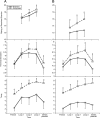Influence of hydration on physiological function and performance during trail running in the heat
- PMID: 20210618
- PMCID: PMC2838466
- DOI: 10.4085/1062-6050-45.2.147
Influence of hydration on physiological function and performance during trail running in the heat
Abstract
Context: Authors of most field studies have not observed decrements in physiologic function and performance with increases in dehydration, although authors of well-controlled laboratory studies have consistently reported this relationship. Investigators in these field studies did not control exercise intensity, a known modulator of body core temperature.
Objective: To directly examine the effect of moderate water deficit on the physiologic responses to various exercise intensities in a warm outdoor setting.
Design: Semirandomized, crossover design.
Setting: Field setting.
Patients or other participants: Seventeen distance runners (9 men, 8 women; age = 27 +/- 7 years, height = 171 +/- 9 cm, mass = 64.2 +/- 9.0 kg, body fat = 14.6% +/- 5.5%).
Intervention(s): Participants completed four 12-km runs (consisting of three 4-km loops) in the heat (average wet bulb globe temperature = 26.5 degrees C): (1) a hydrated, race trial (HYR), (2) a dehydrated, race trial (DYR), (3) a hydrated, submaximal trial (HYS), and (4) a dehydrated, submaximal trial (DYS).
Main outcome measure(s): For DYR and DYS trials, dehydration was measured by body mass loss. In the submaximal trials, participants ran at a moderate pace that was matched by having them speed up or slow down based on pace feedback provided by researchers. Intestinal temperature was recorded using ingestible thermistors, and participants wore heart rate monitors to measure heart rate.
Results: Body mass loss in relation to a 3-day baseline was greater for the DYR (-4.30% +/- 1.25%) and DYS trials (-4.59% +/- 1.32%) than for the HYR (-2.05% +/- 1.09%) and HYS (-2.0% +/- 1.24%) trials postrun (P < .001). Participants ran faster for the HYR (53.15 +/- 6.05 minutes) than for the DYR (55.7 +/- 7.45 minutes; P < .01), but speed was similar for HYS (59.57 +/- 5.31 minutes) and DYS (59.44 +/- 5.44 minutes; P > .05). Intestinal temperature immediately postrun was greater for DYR than for HYR (P < .05), the only significant difference. Intestinal temperature was greater for DYS than for HYS postloop 2, postrun, and at 10 and 20 minutes postrun (all: P < .001). Intestinal temperature and heart rate were 0.22 degrees C and 6 beats/min higher, respectively, for every additional 1% body mass loss during the DYS trial compared with the HYS trial.
Conclusions: A small decrement in hydration status impaired physiologic function and performance while trail running in the heat.
Figures




Similar articles
-
Influence of hydration status on pacing during trail running in the heat.J Strength Cond Res. 2009 Dec;23(9):2533-41. doi: 10.1519/JSC.0b013e3181b73c3f. J Strength Cond Res. 2009. PMID: 19675477 Clinical Trial.
-
Examining the influence of hydration status on physiological responses and running speed during trail running in the heat with controlled exercise intensity.J Strength Cond Res. 2011 Nov;25(11):2944-54. doi: 10.1519/JSC.0b013e318231a6c8. J Strength Cond Res. 2011. PMID: 22024610 Clinical Trial.
-
Mild dehydration and cycling performance during 5-kilometer hill climbing.J Athl Train. 2013 Nov-Dec;48(6):741-7. doi: 10.4085/1062-6050-48.5.01. Epub 2013 Aug 16. J Athl Train. 2013. PMID: 23952038 Free PMC article.
-
Thermoregulation and marathon running: biological and environmental influences.Sports Med. 2001;31(10):743-62. doi: 10.2165/00007256-200131100-00004. Sports Med. 2001. PMID: 11547895 Review.
-
Hydration and physical performance.J Am Coll Nutr. 2007 Oct;26(5 Suppl):542S-548S. doi: 10.1080/07315724.2007.10719656. J Am Coll Nutr. 2007. PMID: 17921463 Review.
Cited by
-
National athletic trainers' association position statement: preventing sudden death in sports.J Athl Train. 2012 Jan-Feb;47(1):96-118. doi: 10.4085/1062-6050-47.1.96. J Athl Train. 2012. PMID: 22488236 Free PMC article.
-
National Athletic Trainers' Association Position Statement: Exertional Heat Illnesses.J Athl Train. 2015 Sep;50(9):986-1000. doi: 10.4085/1062-6050-50.9.07. J Athl Train. 2015. PMID: 26381473 Free PMC article.
-
Hypohydration impairs endurance performance: a blinded study.Physiol Rep. 2017 Jun;5(12):e13315. doi: 10.14814/phy2.13315. Physiol Rep. 2017. PMID: 28637708 Free PMC article. Clinical Trial.
-
Document analysis of exertional heat illness policies and guidelines published by sports organisations in Victoria, Australia.BMJ Open Sport Exerc Med. 2020 Apr 1;6(1):e000591. doi: 10.1136/bmjsem-2019-000591. eCollection 2020. BMJ Open Sport Exerc Med. 2020. PMID: 32342949 Free PMC article.
-
Agreement of urine specific gravity measurements between manual and digital refractometers.J Athl Train. 2015 Jan;50(1):59-64. doi: 10.4085/1062-6050-49.3.47. Epub 2014 Oct 3. J Athl Train. 2015. PMID: 25280126 Free PMC article.
References
-
- Montain S. J., Coyle E. F. Influence of graded dehydration on hyperthermia and cardiovascular drift during exercise. J Appl Physiol. 1992;73(4):1340–1350. - PubMed
-
- Montain S. J., Sawka M. N., Latzka W. A., Valeri C. R. Thermal and cardiovascular strain from hypohydration: influence of exercise intensity. Int J Sports Med. 1998;19(2):87–91. - PubMed
-
- Sawka M. N., Young A. J., Francesconi R. P., Muza S. R., Pandolf K. B. Thermoregulatory and blood responses during exercise at graded hypohydration levels. J Appl Physiol. 1985;59(5):1394–1401. - PubMed
-
- Buono M. J., Wall A. J. Effect of hypohydration on core temperature during exercise in temperate and hot environments. Pflugers Arch. 2000;440(3):476–480. - PubMed
-
- Turkevich D., Micco A., Reeves J. T. Noninvasive measurement of the decrease in left ventricular filling time during maximal exercise in normal subjects. Am J Cardiol. 1988;62(9):650–652. - PubMed
Publication types
MeSH terms
LinkOut - more resources
Full Text Sources
Other Literature Sources
Medical
Miscellaneous

